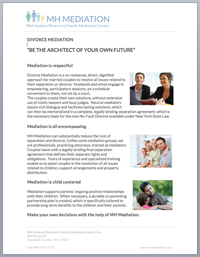Spousal Support Now Based on a Formula
January 3, 2018
After years of argument and debate, the NY Legislature passed a new statute that went into effect in January of 2016. This law has had a significant impact on spousal support, called maintenance in New York, degrees and licenses, and indirectly, on child support.
Highlights:
Degrees no longer marital property: New York had been the only state in the union that considered a degree and/or a license acquired during the course of the marriage as an asset that could be valued and then distributed. This law eliminates degrees and licenses as an asset, but does permit the court to take their acquisition into consideration in making equitable distribution awards.
Formula for spousal support changed significantly: For the last five years, New York has had a temporary spousal support formula, but no formula for post-divorce spousal support. This statute establishes a formula for both temporary and long term support, including recommendations as to how long it should last after the divorce is finalized. The new law also establishes a cap for maintenance — it essentially states that, where one party’s income is significantly greater than the other party’s income, maintenance will be automatically awarded on income up to $175,000 pursuant to the formula. It does give the court permission to award maintenance on a higher amount of income if the court determines it would be unfair not to do so. This is a very big change from the old law in two regards — the cap used to be $500,000, and it only applied to support during the negotiation or litigation of the case, it did not apply after the divorce was granted. After the divorce was granted, there was no formula, just a long list of considerations the Court should weigh in fixing the amount and the duration.
Formula for spousal support changes where the payor is also the custodial parent: Under the old law, there was no distinction in the calculation of spousal support based upon whether the payor was the custodial parent or not. The law has changed, now, and there are two different formulas, depending on whether the higher income spouse is the custodial parent or not.
Formula for child support changes where maintenance is also payable: Under the old law, maintenance was subtracted from a payor’s income when establishing child support, but there were disagreements between Courts as to whether that should happen in the first year of support, or whether it should only apply after one year had passed so maintenance had been payable for at least one year. The new law makes it clear that maintenance should be subtracted from the payor’s income and added to the payee’s income right away for child support calculation purposes.
Formula for child support add-on’s affected by change in the law: Under the old law, the proportionate shares due by each parent for health insurance, uncovered health expenses, child care and other specified items was fixed based upon each parties’ income prior to the payment of child support or maintenance. Under the new law, the proportions are established after the transfer — so child support and maintenance will be subtracted from the payor’s income and added to the payee’s income if the payor is the non-custodial parent. This could make a significant difference in the amount each party is obligated to pay towards the “ancillary” or “add-on” expenses that are not covered by direct child support.
How might the new law affect you?
The new formula is somewhat complicated; if you would like to understand how it might affect your particular situation, you will need to discuss your particular situation directly with your mediator or your lawyer. Remember that it has not gone into effect yet. We will update this article when the governor signs it and if there is any other news affecting the law.
To calculate child support under current law:
Calculate Child Support Under the Current Law
To calculate temporary maintenance under the current law:
Calculate Temporary Maintenance Under the Current Law


